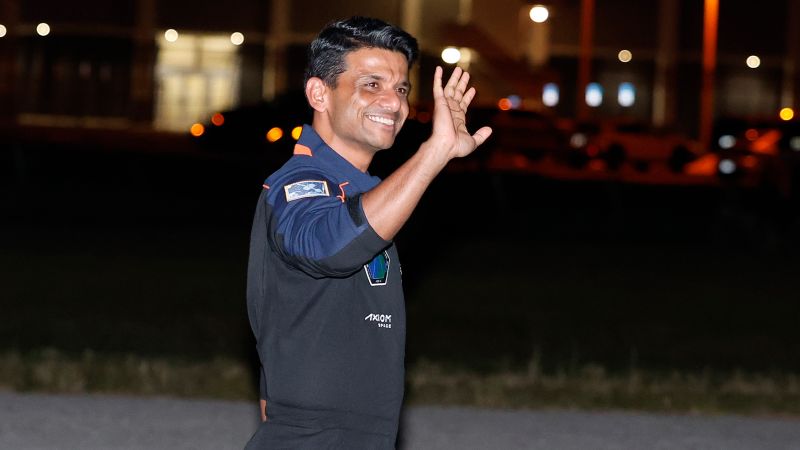Indiahas celebrated another step on its mission to become a space power, after Shubhanshu Shukla became the first astronaut from the country to blast off to the International Space Station (ISS) Wednesday.
Shukla was aboard the private Axiom Space Mission 4, or Ax-4, which lifted off from NASA’s Kennedy Space Center in Florida in the latest mission organized by the Texas-based startup in partnership with Elon Musk’s rocket venture SpaceX.
It is expected to dock in the space-facing port of the station’s Harmony module at 7 a.m. ET on Thursday.
The private mission includes decorated former NASA astronaut Peggy Whitson, as well as Sławosz Uznański-Wiśniewski of Poland and Tibor Kapu of Hungary – two other spaceflight novices who will become the first from their countries to visit the ISS.
Shukla, who is the mission’s pilot, and the others are expected to spend about two weeks aboard the ISS, helping to carry out roughly 60 experiments before returning home.
NASA and the Indian Space Research Organisation (ISRO) are collaborating on the mission, according to a statement from the US space agency.
India’s Prime Minister Narendra Modi said Shukla “carries with him the wishes, hopes and aspirations of 1.4 billion Indians” in a post on X.
“Wish him and other astronauts all the success!” he wrote.
Shukla is only the second Indian citizen to travel into space after Rakesh Sharma, who flew aboard a Soviet rocket in 1984.
Sharma wished the Ax-4 crew well.
“Wishing you all the very best. To the crew, godspeed,” he said in a video message posted online by the Press Trust of India.
“Spend as much time as possible looking out of the window.”
Shukla’s parents were seen getting emotional as they watched a livestream of the blast-off in the northern city of Lucknow.
“He’s the first person, the first Indian in the ISS. It is really a great moment for us Indians,” student Isma Tarikh told Reuters. “It is an inspiration for me… Even I want to become something great and be a world contributor just like (Shukla).”
Another student, Mohammad Hamughan, called it a “proud moment for Indians.”
He told Reuters: “It inspires me to become a space scientist. I have always loved to read about sci-fi and all of the stuff, but this is inspiring for us as a student.”
Shukla’s flight is seen as a precursor to India’s own Gaganyaan mission, the country’s first human space mission, set to take off in 2027.
Four Indian air force pilots selected for that mission have completed initial training in Russia and are undergoing further training in India, according to a May statement from the Indian government.
India’s space ambitions have accelerated under Modi, who was elected to a third term last June and has tried to assert India’s place on the global stage.
In January, it became only the fourth country to successfully achieve an unmanned docking in space.
In 2023, India joined an elite space club becoming the fourth country to land a spacecraft on the moon. The historic Chandrayaan-3 mission, the first to make a soft landing close to the moon’s unexplored South Pole, has collected samples that are helping scientists understand how the moon was formed and evolved over time.
The country has also set its sights on building its own space station by 2035, which will be called the Bharatiya Antariksha Station, and launching its first orbital mission to Venus in 2028.
